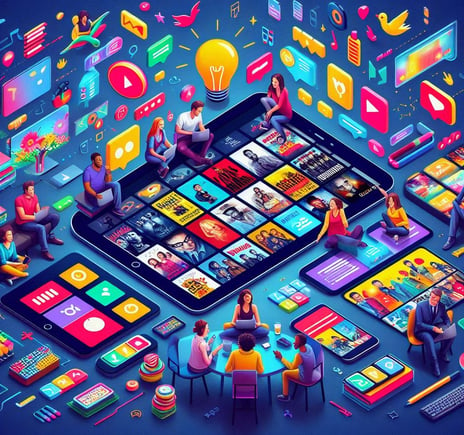

The other day, I was chatting with my friend, and she casually declared, “Oh, I’m just naturally drawn to true crime documentaries." Well, I've known her since 2004, and I could bet my life savings that she would stay as far away from thrillers and crime stories as possible.
Turns out, her “natural” love affair with true crime was more of a sneaky fling with the recommendation algorithms. One thriller movie was all it took to set her on a binge-worthy spiral of murder mysteries.
That got me thinking—are we all just pawns in the algorithm’s game?
Welcome to my rabbit hole of research into what I've come to call the "Algorithm Identity Trap."
The Invisible Hand (of Digital Curation)
Think of the last time you said with confidence, "K-dramas are my thing." Reflect for a second: Were you looking for those genres, or did they find their way to your ears through the seductive whispers of recommendation engines? The algorithmic identity trap is a process whereby the recommendation systems don’t just predict what we like; they create what we like.
Watch one sci-fi flick and boom! Your screen is suddenly flooded with intergalactic adventures. You dive in because, hey, it’s right there. And soon, the algorithms in their relentless pursuit of engagement start serving you more of the same. Before you know it, your self-perception has shifted, and now you've incorporated this interest into your identity narrative.
You’re rebranding yourself as “the space documentary guy” at parties. It’s interesting how these systems build self-fulfilling prophecies.
What's particularly ironic is that in this golden age of infinite choices, our preference formation is increasingly confined to algorithmic corridors. It's like being in a massive library where invisible hands keep shuffling you to certain shelves while making others imperceptible.
So what does this mean for businesses? (Pay Attention, Entrepreneurs!)
If you’re running a business, this phenomenon should light up your radar. Here’s why:
Your data might be lying to you. Your customer data might not be a true testament to their tastes and preferences. Your ‘core demographic’ might just be stuck in an algorithmic echo chamber.
Preferences aren’t permanent. The traditional idea of "customer preferences" needs to be radically rethought. These are not fixed, deep-seated characteristics but rather fragile constructs created by digital infrastructure. This means that a customer’s preference could be a fleeting desire shaped by algorithms.
Break the loop. Breaking these algorithmic patterns holds a lot of untapped potential. Some of your most valuable customers in the future might be those who haven't been "algorithmically conditioned" to want your product yet.
Reshape the narrative. The truly innovative companies will be those that realize they are not only serving existing preferences but also taking an active role in their very formation. It isn't just "What do our customers want?" but "What role are we playing in shaping what they come to want?"
In other words, the businesses that will most thrive in a world where algorithms increasingly define human identity are those that help people break out of their algorithm identity traps—not further exploit them, of course.
The Big Takeaway (and a Little Existential Crisis)
So, the next time you confidently proclaim your love for cooking shows or Viking epics, pause for a second. Ask yourself: Is this really me? Or is it the algorithm whispering sweet nothings into my identity?
Because in the end, the real power move isn’t letting the algorithms shape who you are—it’s reclaiming your story. Now go on, watch that thriller (or don’t). Just make sure it’s because you wanted to.






